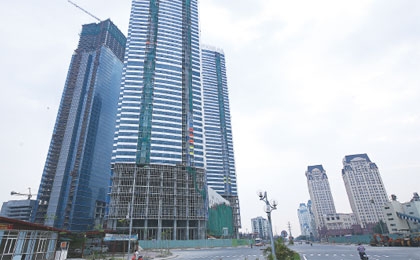Net FDI set to remain upbeat in new year.
 |
The Ministry of Planning and Investment (MPI) last week forecasted that Vietnam would attract at least $11 billion in net foreign direct investment (FDI) capital and $20 billion in committed capital in 2011.
The MPI also reported that foreign investors had poured about $11 billion into investment projects in 2010, a 11 per cent jump compared with 2009. However, the committed capital last year was $18.59 billion, down 17.8 per cent against 2009.
“High FDI disbursement in 2010 shows that Vietnam is still a good place for foreign investors. We believe foreign investors will keep investing into Vietnam,” said Do Nhat Hoang, director general of the MPI’s Foreign Investment Agency (FIA).
Hoang said foreign companies were playing an important role in Vietnam’s economic development.
The high FDI disbursement helped address the trade deficit, which reached $12 billion in 2010.
According to the MPI, foreign-invested enterprises exported $38.8 billion last year and contributed $3.1 billion to the state budget in 2010, 27.8 and 26 per cent increases respectively against 2009.
Phan Huu Thang, director of the Foreign Investment Research Institute at the National Economic University and former FIA director general, said the global economy’s recovery was a solid foundation for investors to keep developing investment projects in Vietnam next year.
Giant multinational companies, like Samsung and Compal in Bac Ninh and Vinh Phuc provinces, continuing to build large projects was evidence that foreign investors were implementing their commitments in Vietnam. Pesico was also planning to build a new manufacturing factory in the Vietnam-Singapore Township and Industrial Park in Bac Ninh province.
While the MPI expects net FDI to continue increasing, many foreign investors have still complained about macroeconomy challenges, like the devaluation of the dong and rising inflation.
During the Vietnam Business Forum held in Hanoi early last month, foreign investors said the government’s approach to economic and monetary policies had raised credibility and confidence issues.
Vietnam’s inflation last year reached 11.75 per cent, the highest rate during the past 22 months, according to the General Statistics Office.
Meanwhile, the dong also weakened against other foreign currencies, especially the US dollar. Since early 2010, the State Bank depreciated the dong by 5.3 per cent against the dollar. In the unofficial market, the dong was even traded at around VND21,500 per dollar versus the official rate of VND19,500.
To dispel the concerns of foreign investors, MPI vice minister Dang Huy Dong said the government would work closely with them to ease all existing obstacles.
“The government has prioritised stabilising the macroeconomy and curbing price hikes this year. This is a strong commitment to ensure a favourable investment climate for investors,” he said.
Dong said he believed the current macroeconomic challenges would not seriously impact the investment plans of foreign investors in Vietnam.
What the stars mean:
★ Poor ★ ★ Promising ★★★ Good ★★★★ Very good ★★★★★ Exceptional
Related Contents
Latest News
More News
- Foreign leaders extend congratulations to Party General Secretary To Lam (January 25, 2026 | 10:01)
- 14th National Party Congress wraps up with success (January 25, 2026 | 09:49)
- Congratulations from VFF Central Committee's int’l partners to 14th National Party Congress (January 25, 2026 | 09:46)
- 14th Party Central Committee unanimously elects To Lam as General Secretary (January 23, 2026 | 16:22)
- Worldwide congratulations underscore confidence in Vietnam’s 14th Party Congress (January 23, 2026 | 09:02)
- Political parties, organisations, int’l friends send congratulations to 14th National Party Congress (January 22, 2026 | 09:33)
- Press release on second working day of 14th National Party Congress (January 22, 2026 | 09:19)
- 14th National Party Congress: Japanese media highlight Vietnam’s growth targets (January 21, 2026 | 09:46)
- 14th National Party Congress: Driving force for Vietnam to continue renewal, innovation, breakthroughs (January 21, 2026 | 09:42)
- Vietnam remains spiritual support for progressive forces: Colombian party leader (January 21, 2026 | 08:00)

 Tag:
Tag:

















 Mobile Version
Mobile Version